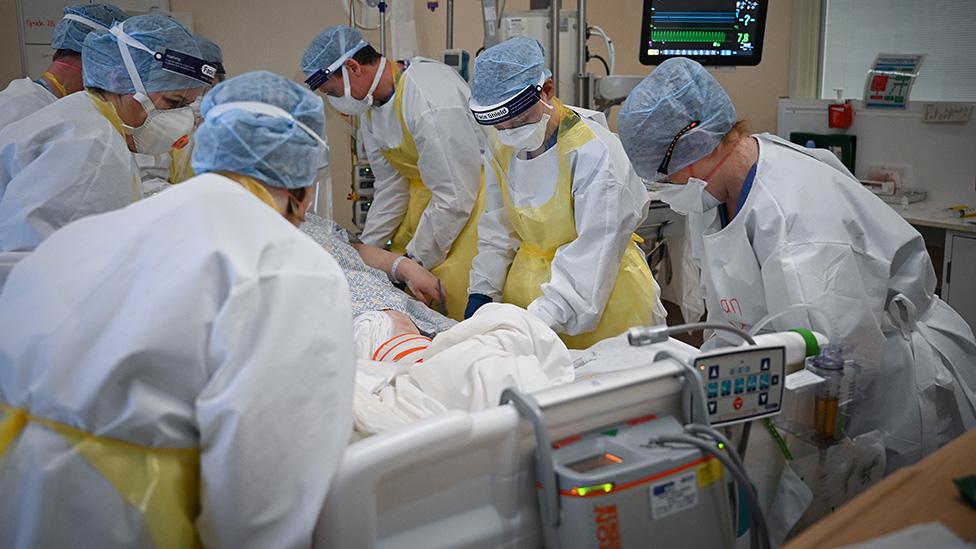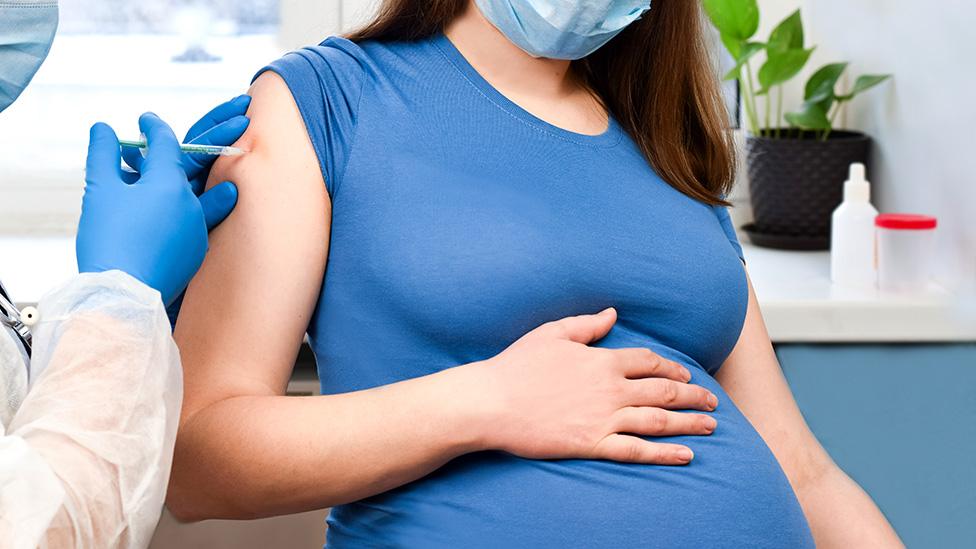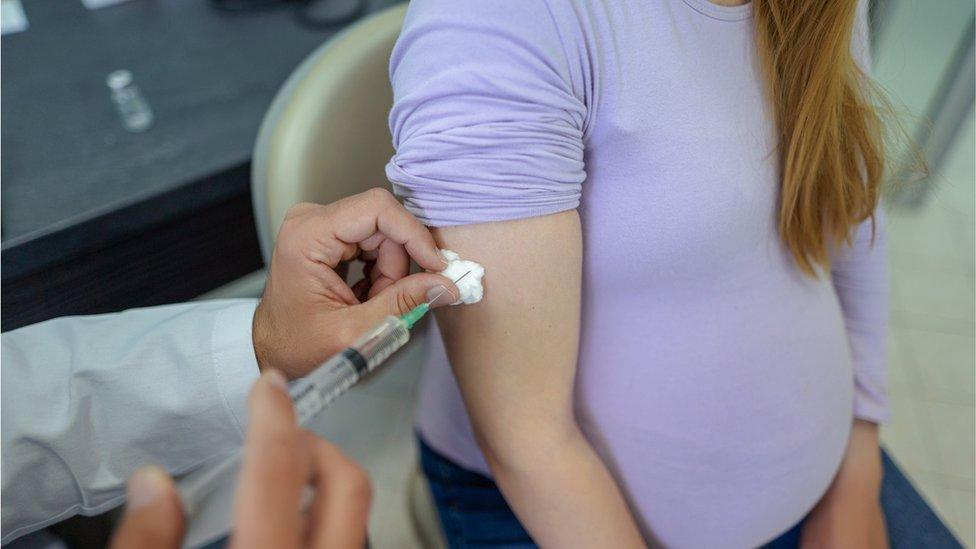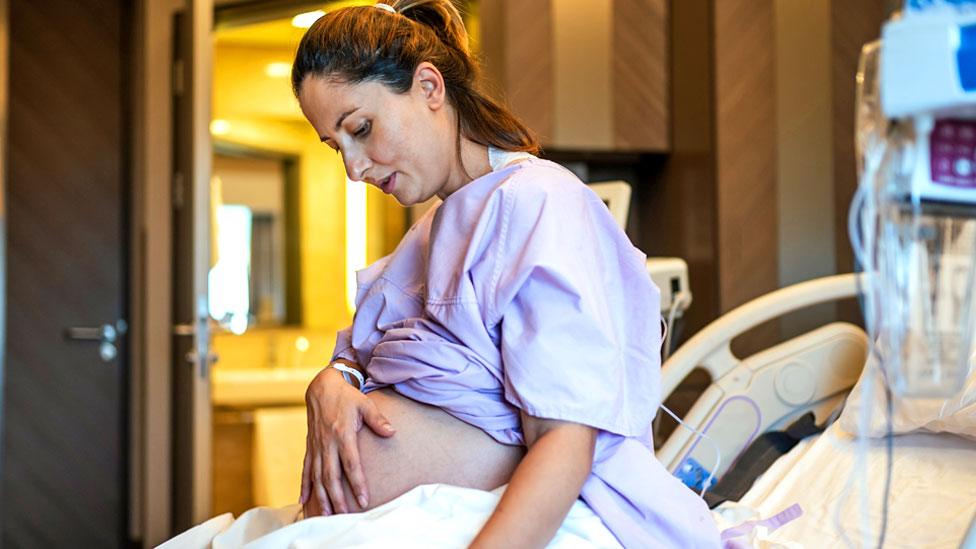Covid in Scotland: Rise in pregnant women needing ICU treatment
- Published

The number of pregnant women needing intensive care has gone up despite overall ICU numbers going down
More than 20% of women admitted to intensive care for Covid-19 since May 2021 were pregnant or had recently given birth, a study has found.
A Scottish Intensive Care Audit Group report said 42 had been admitted since 18 May 2021, compared with 25 in the first two waves of the pandemic.
The number has gone up despite overall intensive care numbers reducing.
The Scottish government said vaccines were the best way to protect against the risks of Covid in pregnancy.
The Scottish Intensive Care Audit Group (SICAG) report, external found that no deaths of pregnant women following ICU treatment had been reported up to 19 September 2021.
The report counts pregnant women admitted to ICUs and women who were admitted within six weeks of giving birth. Admission to high dependency units, used for managing high risk pregnancies, were not included in the figures.
In the first two waves of the pandemic in Scotland, between 1 March 2020 and 17 May 2021, 1,850 Covid patients were admitted to ICU, according to SICAG.
Of this number, 630 were women and about 4% of them were pregnant or had recently given birth.
Since 18 May 2021, 189 women have required intensive care treatment for Covid-19 and 22.2% of them have been pregnant.

Dr Sarah Stock, a consultant in maternal and foetal medicine, said it was still uncertain what had caused the rise.
"It could be because a much lower proportion of pregnant women are vaccinated, or it could be because pregnant women are particularly susceptible to severe disease from the Delta variant that has predominated during the third wave - but we don't know for sure yet," she said.
But Dr Stock, who is co-leading a study into Covid-19 in pregnancy at the University of Edinburgh, external, told BBC Scotland there was "really strong evidence" that pregnant women were more likely than other women to be admitted to hospital and intensive care.
"We also know that although we've had no deaths in Scotland yet, data from around the world and in particular the United States has shown higher mortality rates with Covid-19 in pregnancy than in non-pregnant women," she said.
The consultant said there was also evidence Covid-19 led to higher premature birth rates and probably caused more stillbirths as well.
"Being pregnant affects your response to infections. We know that pregnant women are more susceptible to viruses - and this is probably what we're seeing with Covid-19."
Deprivation link
The SICAG study's authors said they had found "very few" critical care admissions among pregnant women during the first and second waves of the pandemic.
The report continued: "Wave three has seen increased numbers of pregnant women being admitted to hospital with moderate to severe Covid-19 symptoms requiring critical care.
"The majority of patients were pregnant on admission to critical care and 30% were admitted after delivery."
Most of the women lived in the most deprived areas of Scotland, the report added.
The report also found that none of the women who required treatment in intensive care were fully vaccinated at the time of admission.
A separate report by Public Health Scotland (PHS), external, published on 6 October, found vaccine take-up among pregnant women in Scotland was low across all age groups.
PHS estimates that of the 77,679 women who were pregnant between December 2020 and August 2021, about 18% received at least a first dose.

The over-40s have achieved the best level of vaccine coverage so far at 26.5%. The figure drops to 7% in the under-19s.
Although younger age groups were vaccinated later in the roll-out programme, general coverage in all age groups apart from 12-17 year olds in August was above 70%.
Dr Pat O'Brien, vice president of the Royal College of Obstetricians and Gynaecologists, said a number of factors could be influencing the increase in ICU admission figures.
For example, he said an increase in birth rates this year could lead to higher numbers in ICU, as a proportion of all pregnant women will always become severely ill from Covid-19.
But he told BBC Scotland the "key message" was for pregnant women to make sure they were vaccinated.
"There is still a significant number of pregnant women being admitted to ICU with Covid. That's obviously bad for the woman, but it's also bad for the baby," he said.
"All of this is preventable by a vaccine that is perfectly safe to take in pregnancy."

Vaccination take-up among women is low across all age groups when compared with the rest of the population
A Scottish government spokesperson said: "It is clear from the report that unvaccinated people are considerably more likely to require ICU treatment, so it remains vital that everyone who is eligible takes up the offer of vaccination, as this will protect the NHS and save lives.
"This includes pregnant women, as vaccination is the best way of protecting against the risks of Covid in pregnancy."
- Published18 September 2021

- Published30 July 2021
